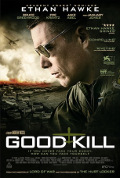
Directed by
Andrew Niccol
103 minutes
Rated M
Reviewed by
Bernard Hemingway

Good Kill
Synopsis: Major Thomas Egan (Ethan Hawke), a decorated fighter pilot with six tours of duty behind him, who has been reassigned to implementing drone attacks on Middle Eastern terrorists from a computer facility just outside Las Vegas where he lives on a new estate with his wife (January Jones) and two children. He is not happy.
With Good Kill, writer-director Andrew Niccol takes on the kind of morally-vexed, psychologically-fraught territory of the American “war on terror” explored in films such as The Hurt Locker and Camp X-Ray. The material is potentially interesting but its transposition to the screen is more muddled than confronting in its exploration of the issues whilst the formulaic delivery robs it of whatever impact it could have had.
In terms of content, Good Kill is surprisingly limited in reach. It criticizes modern warfare as becoming indistinguishable from a computer game simulation but apparently has no problems with war itself. There is some noise made about collateral damage but it would seem on the face of it that given their accuracy, drones may actually be less lethal in this respect than conventional bombing. And since when haven't military personnel carried out the instructions of their unseen bosses who cloak their bloody deeds in euphemistic deceptions?
Egan’s problem is not with dropping bombs on people per se, innocent or not, but like a character out of The Right Stuff, that he’s not putting himself at risk in doing so. He misses “the fear” (however much of that there might be when your enemy has no air force or even much in the way of anti-aircraft artillery) and resents being forced to act on unseen managers’ instructions rather than his own field judgement. Had it confined itself to this immediate story, rather than trying to present itself as a moral forum the film might have been better. As such, the notion that drone attacks are dehumanized and dehumanizing is valid but that is hardly the main issue, one which Niccol’s script, via Lt. Col. Johns (Bruce Greenwood), resolves with a pragmatic us-or-them bottom line.
In terms of form, Good Kills looks sharp but its drama is dulled by its formulaic packaging; particularly Egan’s babe-alicious blonde wife and his two flaxen-haired children and his “co-pilot” ( Zoë Kravitz) who looks like a Hispanic Jennifer Lawrence (Niccol even contrives to get her into a very little black dress). Hawke (whom Niccol directed in his debut feature, Gattaca) is called upon to largely internalize his character’s pain but this mainly means him jutting out his chin Batman-style and refusing to engage in the macho bantering endemic to the base (and which in the early part of the film reaches tiresome proportions) while the camera follows him on his daily routine (and I do mean routine), shuttling back and forth between unhappy work and even unhappier home, downing increasing amounts of vodka and listening to increasingly loud heavy metal rock. And to wrap things up Niccol gives Egan a redemptive act of heroism. At least we were spared a closing Bruce Springsteen song.
You’ve pretty much seen everything in Good Kill in better films like the ones already mentioned and if I was choosing I’d go with them instead.

Want more about this film?


Want something different?




